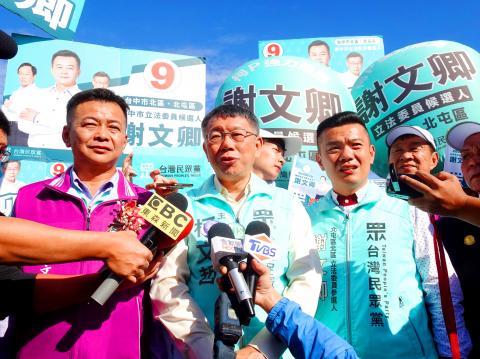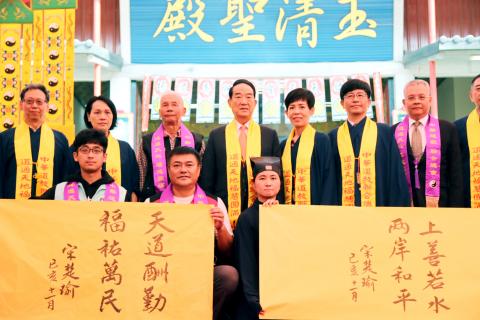Taipei Mayor Ko Wen-je (柯文哲), chairman of the Taiwan People’s Party (TPP), yesterday said that he supports the purpose of the anti-infiltration bill proposed by the Democratic Progressive party (DPP), but its content requires further discussion before it is passed.
The DPP has said it aims to pass the third reading of the draft on Dec. 31. It advanced to a second reading last month.
The 12-article draft would subject those who disrupt the social order under the command or at the request of “infiltration sources” to a prison term of up to seven years or a fine of NT$5 million (US$165,508), and prohibits anyone from donating to a political party, influencing elections, proposing the recall of a government official or launching a public referendum on the instructions or with the financial support of an “infiltration source.”

Photo: Chang Ching-ya, Taipei Times
“The intention behind drafting the act is okay,” Ko said yesterday on the sidelines of a campaign event for TPP legislative candidate Hsieh Wen-ching (謝文卿) in Taichung.
“For sure everyone supports the idea of preventing foreign infiltration from influencing Taiwanese politics and elections, so I support the purpose of the act,” Ko said.
However, the key point to consider is that the act would regulate Taiwanese citizens and businesspeople in China, so there should be adequate discussion about possible problems enforcing the law, he said.

Photo: Cheng Ming-hsiang, Taipei Times
Ko said when he made a similar remark on Friday, some reports and people online described him as being against the act, which he thought was “misleading.”
Ko on Friday said that the bill should not be passed without sufficient discussion, because if it was passed without a clear understanding on how it would be enforced, it would make many Taiwanese citizens feel anxious and worry about whether they were breaching the law.
Separately yesterday, People First Party Chairman and presidential candidate James Soong (宋楚瑜) said he disagrees with the draft.
“More than 2 million Taiwanese businesspeople are working hard in China to make a living for their families,” he said. “They are all our fellow citizens and should not be viewed as enemies.”
“If cross-ministerial coordination, sufficient understanding or verification of accusations cannot be achieved, allowing the act to be passed in such a hurry will affect the government’s credibility and be unfair to innocent citizens,” he said.
There is less than a month until the elections, which would represent what the latest public opinion was, so arbitrarily trying to pass the draft at this time would be controversial, Soong said.
He urged the DPP not to insist on passing the bill hastily for election gains, saying that the party should exercise restraint or it could face unsettling consequences.
Additional reporting by Cheng Ming-hsiang

Taiwan is stepping up plans to create self-sufficient supply chains for combat drones and increase foreign orders from the US to counter China’s numerical superiority, a defense official said on Saturday. Commenting on condition of anonymity, the official said the nation’s armed forces are in agreement with US Admiral Samuel Paparo’s assessment that Taiwan’s military must be prepared to turn the nation’s waters into a “hellscape” for the Chinese People’s Liberation Army (PLA). Paparo, the commander of the US Indo-Pacific Command, reiterated the concept during a Congressional hearing in Washington on Wednesday. He first coined the term in a security conference last

Prosecutors today declined to say who was questioned regarding alleged forgery on petitions to recall Democratic Progressive Party (DPP) legislators, after Chinese-language media earlier reported that members of the Chinese Nationalist Party (KMT) Youth League were brought in for questioning. The Ministry of Justice Investigation Bureau confirmed that two people had been questioned, but did not disclose any further information about the ongoing investigation. KMT Youth League members Lee Hsiao-liang (李孝亮) and Liu Szu-yin (劉思吟) — who are leading the effort to recall DPP caucus chief executive Rosalia Wu (吳思瑤) and Legislator Wu Pei-yi (吳沛憶) — both posted on Facebook saying: “I

Sung Chien-liang (宋建樑), who led efforts to recall Democratic Progressive Party (DPP) Legislator Lee Kun-cheng (李坤城), was released on bail of NT$80,000 today amid outcry over his decision to wear a Nazi armband to questioning the night before. Sung arrived at the New Taipei District Prosecutors’ Office for questioning in a recall petition forgery case last night wearing a red armband bearing a swastika, carrying a copy of Adolf Hitler’s Mein Kampf and giving a Nazi salute. Sung left the building at 1:15am without the armband and covering the book with his coat. Lee said today that this is a serious

A court has approved Kaohsiung prosecutors’ request that two people working for Democratic Progressive Party (DPP) Legislator Lin Dai-hua (林岱樺) be detained, as a probe into two cases allegedly involving her continues. The request was made on Friday, after prosecutors raided Lin’s two offices and the staffers’ residences, and questioned five on suspicion of contravening the Anti-Corruption Act (貪汙治罪條例). The people included the directors of Lin’s Daliao (大寮) and Linyuan (林園) district offices in Kaohsiung, surnamed Chou (周) and Lin (林) respectively, as well as three other staffers. The prosecutors’ move came after they interrogated Lin Dai-hua on Wednesday. She appeared solemn following